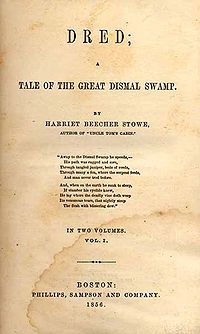Dred: A Tale of the Great Dismal Swamp

Title page of the first edition
|
|
| Author | Harriet Beecher Stowe |
|---|---|
| Country | United States |
| Language | English |
| Genre | Novel |
| Publisher | Phillips, Sampson and Company (first edition) |
|
Publication date
|
1856 |
| Media type | Print (Hardback & Paperback) |
| Pages | 329 (vol. I, first edition), 370 (vol. II, first edition) |
Dred: A Tale of the Great Dismal Swamp is the second popular novel from American author Harriet Beecher Stowe. It was first published in two volumes by Phillips, Sampson and Company in 1856. Although it enjoyed better initial sales than her previous, and more famous, novel Uncle Tom's Cabin, it was ultimately less popular. Dred was of a more documentary nature than Uncle Tom's Cabin and thus lacked a character like Uncle Tom to evoke strong emotion from readers.
Dred is the story of Nina Gordon, an impetuous young heiress to a large southern plantation, whose land is rapidly becoming worthless. It is run competently by one of Nina's slaves, Harry, who endures a murderous rivalry with Nina's brother Tom Gordon, a drunken, cruel slaveowner. Nina is a flighty young girl, and maintains several suitors, before finally settling down with a man named Clayton. Clayton is socially and religiously liberal, and very idealistic, and has a down-to-earth perpetual-virgin sister, Anne.
In addition to Harry (who, as well as being the administrator of Nina's estate, is secretly also her and Tom's half-brother), the slave characters include the devoutly Christian Milly (actually the property of Nina's Aunt Nesbit), and Tomtit, a joker-type character. There is also a family of poor whites, who have but a single, devoted slave, Old Tiff.
Dred, the titular character, is one of the Great Dismal Swamp maroons, escaped slaves living in the Great Dismal Swamp, preaching angry and violent retribution for the evils of slavery and rescuing escapees from the dog of the slavecatchers.
The response to Stowe's first work greatly impacted her second anti-slavery novel. Uncle Tom's Cabin drew criticism from abolitionists and African-American authors for the passive martyrdom of Uncle Tom and endorsement of colonization as the solution to slavery. Dred, by contrast, introduces a black revolutionary character who is presented as an heir to the American revolution rather than a problem to be expatriated. Dred can thus be placed within an African-American literary tradition as well as a political revision of the sentimental novel (see David Walker's Appeal (1829) and Frederick Douglass's The Heroic Slave (1852)).
...
Wikipedia
